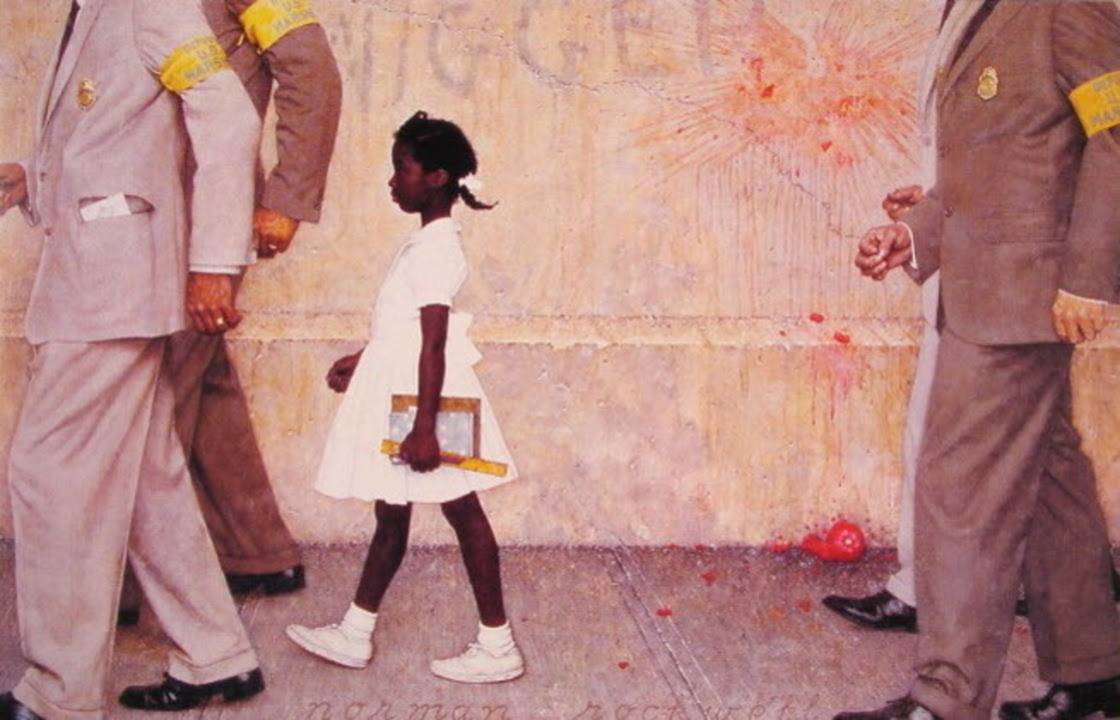Interfaith Insight - 2021
Permanent link for "In a climate of fear and hate, can we learn from a six-year-old?" by Doug Kindschi on June 15, 2021
How can we deal with the division and even hatred we observe in our society? Recalling an earlier time, when our society was divided to the point of hate, can be instructive. In this case the teacher is the 6-year-old Ruby Bridges, who in 1960 was escorted by federal marshals to a white elementary school in New Orleans. As the only black student in the all-white school, she studied alone that year with Barbara Henry, a young teacher from Boston, and the two worked together in an otherwise vacant classroom for an entire year. Every day the marshals escorted Ruby Bridges to school, and she remained in the school even when all of the other parents withdrew their children.
Her case became known nationally in news reports and later when the artist Norman Rockwell painted the event of her attending school with federal marshal escort. The painting, titled “The Problem We All Live With,” was featured in Look magazine in 1964 and became an iconic representation of school integration efforts of that decade.
The protests against school integration aimed at this young child as she went to school each day were truly disturbing, as hundreds shouted their threats and hatred. The child psychiatrist Robert Coles took an interest in Ruby Bridges and wondered how she could stand up to all of this pressure. He began meeting with her weekly to learn more about how she was dealing with it all.
One day her teacher mentioned that she saw Ruby talking to the protesters outside the school building. When Coles asked Ruby what she was telling them, she responded that she wasn’t talking to them; she was talking to God and praying for the people in the streets.
In an interview, Coles asked her why she was praying for the people in the streets. She looked at him and said, “Don’t you think they need praying for?” When asked where she got that idea, she responded that she got it from her mother and father and from their minister in church. She said she prayed for them every morning on the way to school and also on the way home. Coles then asked what she prays, and she responded that she always said the same thing: “Please, dear God, forgive them because they don’t know what they are doing.”
This very young child had learned from her parents, who themselves could not read or write, this truth which Jesus had said from the cross and the Hebrew prophets had declared repeatedly. Forgiveness is also central in the Quran and taught by all of the religions. It is the key not only to peace among people but also to living with oneself without resentment and self-hate.
Robert Coles went on to teach at Harvard University’s School of Medicine and to write the Pulitzer Prize-winning series “Children of Crisis,” as well as books on the moral and spiritual intelligence of children. In addition to his over 80 scholarly books, he also wrote the illustrated children’s book, “The Story of Ruby Bridges.” In that same interview, Coles exhorts us to not just strive to get an A in biblical literature, or an A in moral analysis, but to “get the kind of ‘A’ Ruby got” by living out this attitude toward others.
Have things changed since that year in the 1960s when Ruby was the only student who attended her school for the whole year? Yes, as the year progressed, Ruby continued to study alone with that teacher and eventually the crowds protesting outside began to thin. The following year the school enrolled additional Black students, and Ruby eventually graduated from a desegregated high school. Ruby later married and raised four sons.
In the 1990s she reunited with her first teacher and the two did speaking events together. Ruby later wrote two books about her early experiences and received the Carter G. Woodson Book Award. She continued her activism for racial equality and established the Ruby Bridges Foundation to promote tolerance and change in education.
Yes, we have made changes impacting many individual minority students, but there is still much to do. Systems of racial disparity permeate our education, culture, and economic structures. In our current political environment, when disagreement, misunderstanding and conflict often turn ugly to the point of hate talk and hate action, we need to learn again the simple truth that was expressed by this 6-year-old. As we examine our own attitudes toward those with whom we disagree, whether it is political or religious, we may need Ruby’s forgiveness prayer for ourselves.
In an issue of the magazine Christian Century, publisher Peter Marty reminded us of this story and wrote, “We ought to pray those Jesus words ourselves, speaking them with the confident spirit of Ruby Bridges: ‘Please dear God, forgive us because we often don’t know what we’re doing.’”


